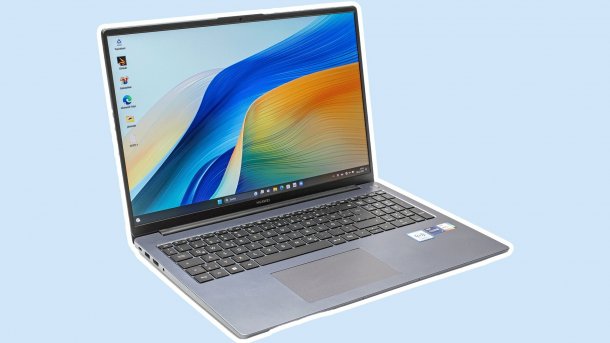Intel allegedly no longer allowed to sell mobile processors to Huawei
The US Department of Commerce prohibits Intel and Qualcomm from supplying Huawei, which uses Intel chips in its MateBook series notebooks, for example.

Notebook Huawei MateBoook D16 mit Intel Core i9-13900H
(Bild: c’t Magazin)
The Chinese company Huawei has been on the US Department of Commerce's sanctions lists for years. However, US companies can obtain exemptions for certain products to continue supplying them to Huawei. These special rights have now been revoked at short notice for Intel and Qualcomm, according to US media reports citing anonymous sources. Intel's share price fell further as a result, as Chinese customers are important to Intel: according to its annual report (SEC 10K), Intel generated 27% of its total revenue in China in 2023.
According to Reuters and Bloomberg, the responsible authorities at the US Department of Commerce have not yet released any further information and Intel has not yet commented publicly on the issue.
Exceptional approvals required
Intel had received approval to supply Huawei from the Trump administration. AMD later applied to the Biden administration for a similar export license, but did not receive it.
It had already become known in March that the supply license for Intel was due to expire this year and would probably not be renewed. Apparently, investors were nevertheless surprised.
Intel CEO Pat Gelsinger had argued a few months ago that his company should be allowed to continue exporting to China. This has been the case to date; PC market leader Lenovo, for example, is also a Chinese company. However, the US companies Nvidia, AMD and Intel are only allowed to sell AI chips to Chinese companies up to a certain maximum computing power.
Qualcomm is less affected, and it was probably only about 5G modem chips; US companies are no longer allowed to supply smartphone processors to Huawei anyway.
German economy is watching closely
The German economy is watching the US export restrictions against China very closely. Some large car companies in particular are heavily dependent on sales in China. According to the Kiel Institute for the World Economy, a simulation calculation for the German economy as a whole showed that "Germany's economy would collapse by around 5 percent in the event of an abrupt trade ban with China". This is comparable to the declines as a result of coronavirus and the financial crisis. "In the medium to long term, the loss will stabilize at around 1.5 percent annually. A gradual, cautious reduction in trade relations would avoid the high initial costs."
(ciw)